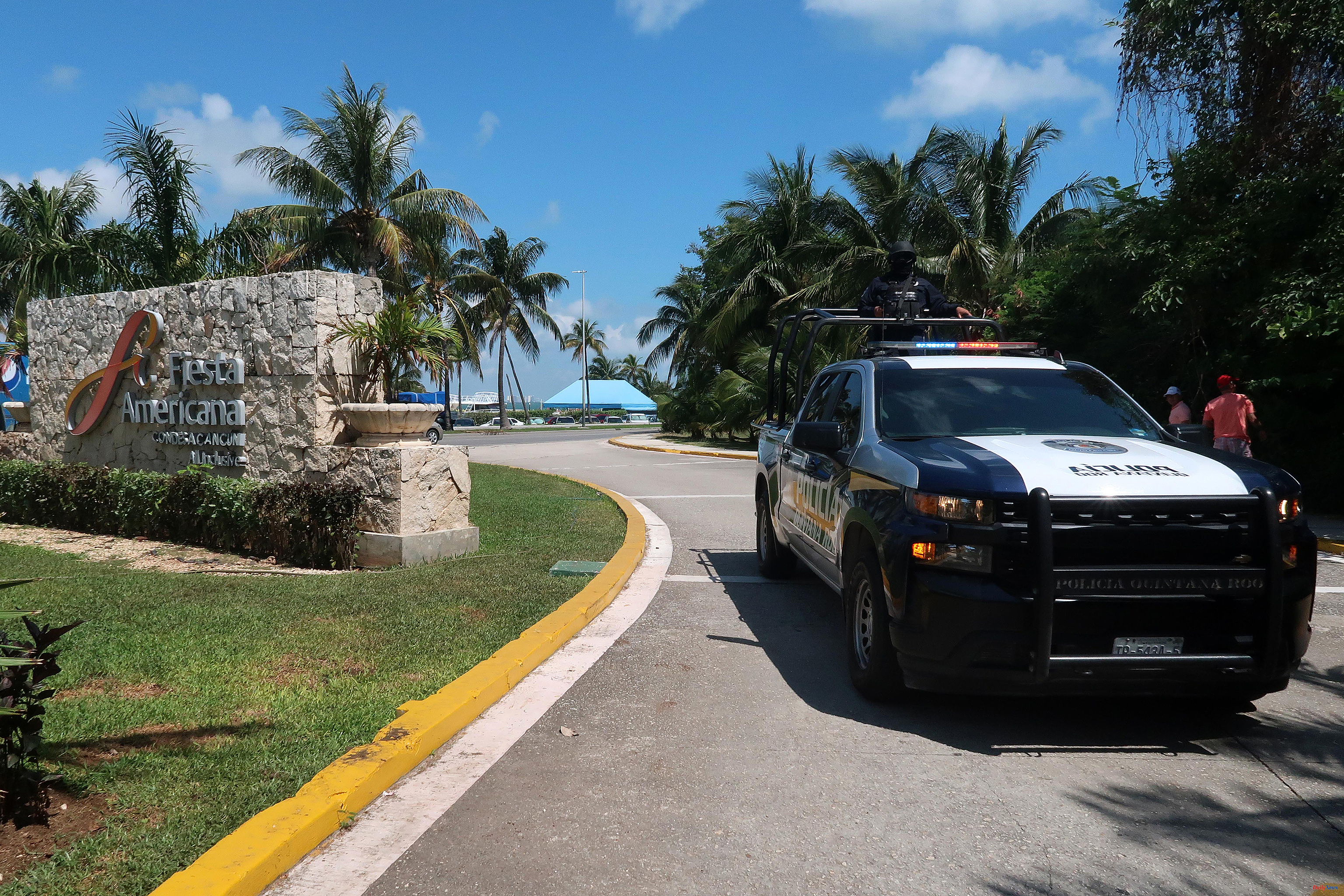Machine guns and military uniforms have crept into the photographs of tourists who arrive in the Mexican Caribbean to enjoy the Easter holidays. The murder of a dozen people, coinciding with the start of the festivities, has pushed the government of López Obrador to deploy more than 8,000 soldiers to patrol the paradisiacal beaches of white sand and turquoise blue water. After three years in which the pandemic has ostensibly reduced tourist income in the area, the authorities are now trying to prevent the endemic violence suffered by the country from ending up scaring away sun and beach visitors who sustain the local economy.
The most recent violent episode occurred last Monday at the luxurious 'Fiesta Americana Condesa' hotel in Cancun. A group of armed men dressed in Hawaiian shirts got out of a vehicle and murdered four people who were resting on the resort's loungers at point-blank range. The first hypotheses suggest that the victims were involved in drug trafficking and that they were murdered by members of a rival gang. After the attack, the authorities installed roadblocks to try to locate the attackers, among whom would be Héctor Flores, a well-known local drug trafficker nicknamed 'Pantera'. Days before, an American tourist suffered a gunshot wound when he was enjoying a few days off in Puerto Morelos, just 40 km from Cancun.
At the other end of the country, on the Pacific coast, the wave of violence has hit Acapulco particularly hard. What was the country's tourist mecca during the 1980s has become in recent years one of the most dangerous cities in the country. On April 3, a shootout broke out on Caleta beach that left four dead and four injured. Some witnesses managed to record with their phones the scenes of panic experienced during the attack, with dozens of tourists in bathing suits running desperately between the loungers in search of refuge. In the previous days, a taxi driver was injured after being shot in the head and two corpses wrapped in plastic bags emerged from the Pacific before the incredulous gaze of dozens of tourists.
Faced with the national and international commotion generated by these attacks, the Mexican government decided to act quickly and announce an unprecedented militarization of the beaches. A total of 4,724 soldiers have been deployed in Acapulco, Cancun, Tulum, Puerto Vallarta, Mazatlán and Veracruz. In addition, as revealed by the Secretary of Defense, Luis Cresencio Sandoval, another contingent of 3,800 uniformed officers will monitor hundreds of highways, 14 airports and 42 bus stations, escorted by six helicopters, 755 patrol cars, 377 vans, 10 boats and 45 quads.
Despite the fact that the presence of the Army can generate mistrust among visitors, merchants and hoteliers see it with good eyes. As explained to EL MUNDO Toni Chaves, president of the Riviera Maya Hotel Association, "in the sector we understand that the presence of public order forces on the beaches strengthens security. We see it favorably, since they are going to prevent any type of insecurity situation from occurring. This businessman of Canarian origin is one of those who best knows the reality of the destination. He has been living in Mexico for more than two decades and, in addition to leading the main hotel consortium in the country, he is the founder and director of 'NAH Hotels', a chain that already has eight hotels in six destinations in the Mexican Caribbean.
"The definitive proof that it continues to be a safe destination is that it is the favorite for all the tourists in the world," says Chaves, who describes the violent incidents registered at the beginning of Holy Week as "isolated cases that are the product of direct confrontations among criminals." Tourism has an enormous weight in the economy of the state of Quintana Roo, where the Riviera Maya is located, representing 87% of its GDP and generating more than 120,000 direct jobs and 350,000 indirect ones. This state has also traditionally been one of the safest in the country, but in recent years the trend has reversed. According to figures from the National Public Security System, Quintana Roo recorded 259 homicides during the first two months of this year, a figure slightly higher than the previous year, when 216 murders were recorded.
Mexico is one of the 10 most visited countries in the world and Cancun represents almost half of its international tourist flow, with 30 million visitors during 2022. This Easter, in which national, European and traditional 'Spring' holiday periods coincide Break' from Canada, the US or Japan, an economic spillover of 8,000 million euros is expected in the Riviera Maya, the largest since the start of the pandemic. Everything indicates that the wave of violence experienced on the eve of the holidays and the travel alerts issued by some countries have not reduced hotel occupancy which, according to figures from the Confederation of National Chambers of Commerce, Services and Tourism, is currently at 85% in the Riviera Maya and 92% in Acapulco.
Despite the fact that he came to power promising to "return the military to the barracks," López Obrador has given the military a central role in his transformative political project. The Mexican president has delegated a multitude of powers to the Army, from customs, immigration and street surveillance, to the construction of large infrastructure projects, such as the 'Maya Train' or the new airport in Mexico City. His latest mission reveals to what degree insecurity has taken over the country. Far from the violent scenarios for which they were trained, soldiers now patrol bucolic beaches to prevent the dark side of the Mexican Caribbean from emerging while foreign tourists enjoy their vacations.
According to the criteria of The Trust Project












